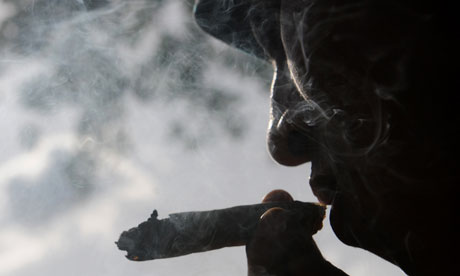It made big news last week when the Mexican president, Felipe Calderón, called for a reasoned debate about the failure of drug prohibition. In doing so, he joined his already outspoken predecessors Vicente Fox and Ernesto Zedillo, as well as other former Latin American presidents like César Gaviria of Colombia and Fernando Henrique Cardoso of Brazil. Latin American policymakers have learned that drug prohibition, more than the drugs themselves, is a problem. Prohibition of desire simply cannot work.
Since taking office in late 2006, Calderón has sent more than 45,000 soldiers into battle with the cartels, but, almost four years later, the Mexican drug business continues to thrive. This policy failure is not unique to Mexico. After 40 years of the international "war on drugs", the only consistent outcome has been that drugs keep getting cheaper, more potent and far easier for people – especially our children – to access everywhere.
This failure, however, is not even the main concern. More relevant are the immense risks, harm and pains caused by prohibition. Especially the violence.
A recent multi-decade review by the International Centre for Science in Drug Policy found that, when police crack down on drug users and dealers, the result is almost always an increase in violence.
Mexicans can confirm it. Calderón's offensive against the cartels has unleashed a wave of violence that has killed more than 28,000 people, including innocent civilians caught in shootouts. The folks in the Mexican bar who saw the decapitated heads roll over their dance floor as prohibition-funded gangs sent their message of dominance can surely confirm it.
Brazilians can also confirm it. In the city of Rio de Janeiro, in 2008 alone, there were 2,757 murders. One in five was a summary execution during police operations against drug dealers in the ghettos called favelas.
In the Brazilian drug war, these are the "enemies". They are mostly very young. They proudly hold their machine-guns that replace the toys they never had.
They battle for marginalised territories and for their occasional profits. Like most poor Brazilian boys, they dream of becoming famous soccer players, but they do not have the opportunity. They have no hope. They do not live long. They kill and die. Soon, other children take their places.
The tragic deaths of these lost children are inevitable outcomes of a policy that is defined as a "war", in which the "criminal" now becomes the "enemy", who must kill or be killed. They arm themselves against the police and their competitors. The police arm themselves against them. It is a self-fulfilling, bloody prophecy. It is the predictable hallmark of drug prohibition.
Violence is not necessarily related to drugs. As the alcohol or tobacco businesses demonstrate, the production and supply of drugs are not inherently violent activities. Weapons and violence only accompany those activities when undertaken in an illegal market. The prohibition yields the violence, as disputes must be settled out of court and on the streets. Paradoxically, when we prohibit these widely used substances, we are actually relinquishing meaningful control over them.
Prohibition consigns the drug market to criminalised actors not subject to oversight of any kind. Legalisation would mean regulation and regulation is the best way to control the dangers of drug use, while cutting the cartels off at the knees.
Every country that has provided a glimpse of what a regulated future might look like has experienced lowered rates of death, disease, crime and addiction. The Swiss policy of treating heroin addiction as a health issue rather than a moral or criminal one has been a resounding success with, among other indicators, a 60% reduction in criminal activity among participating addicts. When Portugal legalised the possession of all drugs, it experienced a decade of sharp declines in overall drug use, especially among the young. In Amsterdam, where over-the-counter marijuana sales have been tolerated for decades, rates of use among teenagers are much lower than they are in the US, where harsh penalties abound.
Latin America is advancing the debate, but even in the US there are efforts to undo the damage of prohibition, the most prominent being California's effort to legalise marijuana.
Hopefully, the thousands of Mexicans, Brazilians and people from other parts of the world who have been killed in the insane "war on drugs" will not have died in vain. Their deaths are already showing that it is time to put an end to all the pain and harms caused by drug prohibition; it is time to legalise and regulate the production, the supply and the consumption of all drugs.
Maria Lucia Karam, a board member of Law Enforcement Against Prohibition (Leap), is a retired judge in Brazil






